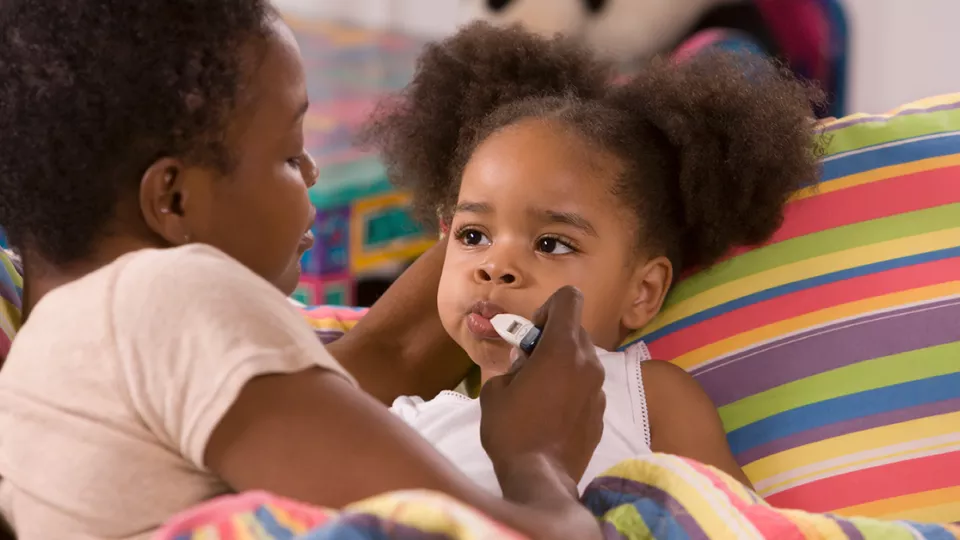
As a parent, it’s natural to worry when your baby develops a fever. Understanding what’s normal and when to seek medical attention can help you care for your little one with confidence.
What Is a Fever?
A fever is when the body’s temperature rises above its normal range. For babies, a rectal temperature of 100.4°F (38°C) or higher is considered a fever. Fevers are often the body’s way of fighting infections.
Common Causes of Fever in Infants
- Infections: Most fevers in this age group are due to viral infections, like colds or the flu. Bacterial infections are less common but can occur.
- Immunizations: Sometimes, babies develop a mild fever after vaccinations.
- Overdressing: Dressing a baby too warmly can raise their body temperature.
When to Call the Doctor
It’s important to monitor your baby’s behavior and symptoms. Contact your pediatrician if:
- Age 3-6 months: Your baby has a rectal temperature above 102°F (38.9°C) or a lower fever but appears unusually irritable, lethargic, or uncomfortable. mayoclinic.org
- Any age: Your baby shows signs like difficulty breathing, persistent vomiting, rash, or if the fever persists longer than a few days.
How to Measure Your Baby’s Temperature
For infants, the most accurate method is a rectal temperature measurement:
- Clean the Thermometer: Use soap and water or alcohol.
- Apply a Small Amount of Lubricant: Such as petroleum jelly, to the tip.
- Place Your Baby on Their Back: Lift their legs gently.
- Insert the Thermometer: About 1/2 to 1 inch into the rectum.
- Hold Steady: Wait until the thermometer signals it’s ready.
- Read and Record the Temperature.
Fever recording documents:
Tips for Managing Your Baby’s Fever
- Keep Them Hydrated: Offer regular feedings to prevent dehydration.
- Dress Comfortably: Use lightweight clothing and keep the room at a comfortable temperature.
- Use Fever-Reducing Medication: If advised by your doctor, you can give acetaminophen (Tylenol) to reduce discomfort. Always follow the recommended dosage and consult your pediatrician before administering any medication. mayoclinic.org
- Monitor Their Behavior: Keep a close eye on changes in feeding, sleeping, and activity levels.
What Not to Do
- Avoid Aspirin: Do not give aspirin to your baby due to the risk of Reye’s syndrome. healthychildren.org
- No Cold Baths: Avoid using cold water or alcohol rubs to reduce fever, as they can cause shivering and increase body temperature.
Preventing Fevers
- Regular Handwashing: Helps prevent the spread of infections.
- Keep Up with Vaccinations: Ensure your baby receives all recommended immunizations on schedule.
- Avoid Overheating: Dress your baby appropriately for the environment and avoid heavy blankets.
Trust Your Instincts
As a parent, you know your baby best. If something doesn’t feel right, don’t hesitate to contact your pediatrician. It’s always better to seek reassurance when it comes to your child’s health.
Fact sheets and further readings:
Remember, while fevers are common in infants and often not serious, staying informed and prepared is key to ensuring your baby’s well-being.
Video Resources:
English:
Spanish:
Bibliography: 📚
1️⃣ Mayo Clinic – Fever Treatment: Quick Guide to Treating a Fever
2️⃣ American Academy of Pediatrics (AAP) – HealthyChildren.org – Fever (0-12 Months)
3️⃣ Centers for Disease Control and Prevention (CDC) – Caring for Infants & Young Children with Fever
4️⃣ World Health Organization (WHO) – Fever Management and Infant Care
Legal Disclaimer: The information provided by our nonprofit is for informational purposes only and not a substitute for professional medical advice, diagnosis, or treatment. Always consult a qualified healthcare provider for medical concerns. We make no guarantees about the accuracy or completeness of the information and are not liable for any decisions made based on it. If you have a medical emergency, call 911 or seek immediate medical care.


